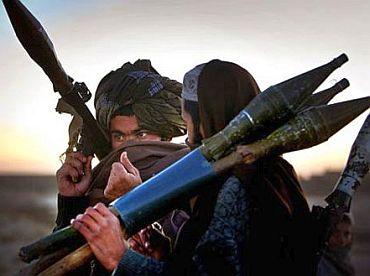 Did Pakistan's Inter Services Intelligence 'give up' its spies as pawns to launch an offensive against the Taliban militia in the country's North Waziristan region?
Did Pakistan's Inter Services Intelligence 'give up' its spies as pawns to launch an offensive against the Taliban militia in the country's North Waziristan region?
Yes, if reports are to be believed. On March 26, former ISI agents Khalid Khwaja and retired Colonel Amir Sultan Tarar (popularly known as Colonel Imam), and Asad Qureshi, a British journalist of Pakistani origin, were sent to North Waziristan.
The Taliban, who promptly accosted the 'guests', killed Khwaja. The Taliban is negotiating the fate of the two others with Pakistani authorities.
Pakistan is in a peace deal with the militants in North Waziristan. But the Haqqani network's activists and foreign militants' presence in the area has put Islamabad under tremendous pressure from the United States.
Sources say that Khwaja's killing may give Islamabad good enough reason to conduct an operation in North Waziristan against the militants led by Hafiz Gul Bahadur. According to a government insider, Islamabad is also awaiting support funds worth $600 million from coalition countries fighting in Afghanistan.
Khwaja already knew about his 'dubious position' in the Taliban side, but some people allege that he was forcibly sent to the area. According to his family, the former ISI officer called his son from Kohat (a district of the North-West Frontier Province) and said that he wanted to return home. But instead he was sent to North Waziristan.
After Taliban took the trio hostage, Khwaja reportedly confessed in a video, "I hatched a plan with some other clerics to eliminate the Lal Masjid movement from Islamabad. I trapped Maulana Abdul Aziz, the prayer leader of Lal Masjid, thus leading to his arrest. I was also planning to malign some other jihadi leaders. Media portray me as a good person, but actually I work for the ISI and Central Intelligence Agency."
"Khwaja's confession, especially about his role in Lal Masjid incident, pleased militants. They killed a spy who pretended to be a Taliban sympathiser, but was in reality an enemy," said Saleem Dawar, a local of Mir Ali province, while talking to rediff.com on the phone.
Apart from pseudo-militant faction Asian Tiger no other group accepted the responsibility of the incident. However, Dawar says: "The case was handled by all Taliban factions as a unit, but nobody took responsibility, may be to avoid the government's attention. The Punjabi Taliban were more eager to kill Khwaja, as they knew much more about his character. These hostages were also taken to some high-profile members of Tehrik-e-Taliban Pakistan and they too agreed that Khwaja should be killed immediately."
The Taliban are yet to decide on the fate of Colonel Imam. There are chances that the former ISI official and once Pakistan's consul general in Herat, Afghanistan, may be freed in return for arrested Taliban militia.
"The Ilyas Kashmiri group is very much against Colonel Imam and says that after the fall of Taliban in 2001 he was behind the arrest of a number of Arab jihadists. The group has shifted to Orakzai agency and if his members get hold of the Colonel, he would not be spared," Dawar added.
Dawar says, "A number of meetings have taken place on Colonel Imam's case, but so far no final decision has been taken."
Some reports say that Afghan Taliban chief Mullah Muhammad Omar has sent a jirga to negotiate the safe release Colonel Imam, but some experts disagree with this idea and say that he is no more important for Afghan Taliban, especially after 9/11.
Popular Taliban writer Abdul Rahim Muslim Dost, who wrote a book titled Da Guantanamo Bay Inzoor (Prison of Guantanamo Bay) on his release from the US prison facility in Cuba, called Colonel Imam names while accusing him for the arrest of high profile jihadists.
As for the fate of the British journalist, Dawar said, "The foreigner is a valuable asset for the militants. So they are in no hurry and will use him according to their needs."





